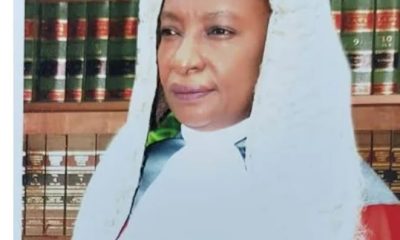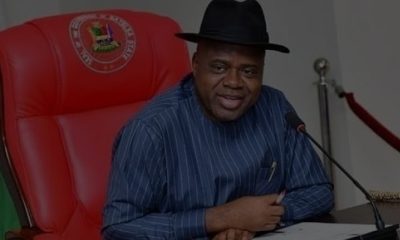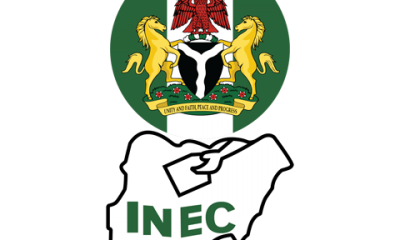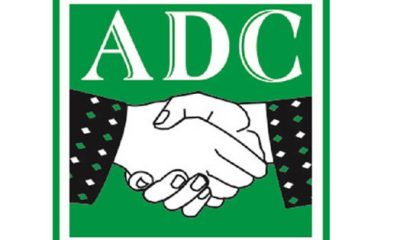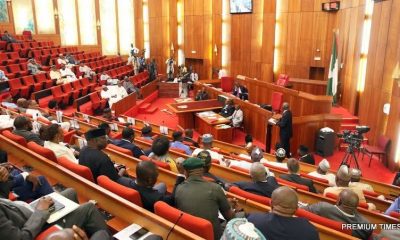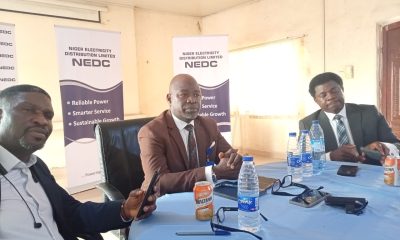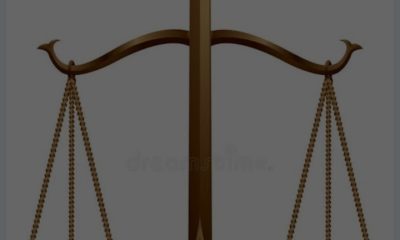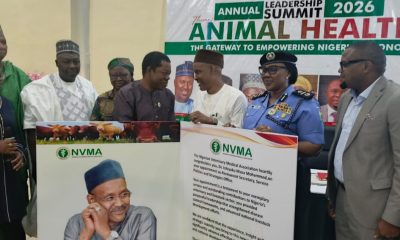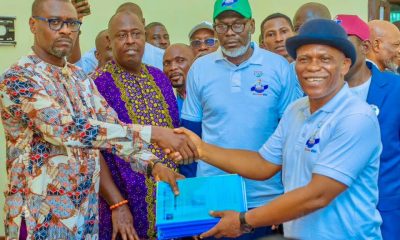Politics
Mahmood Yakubu Steps Down, May Agbamuche-Mbu Takes Over as Acting INEC Chairman
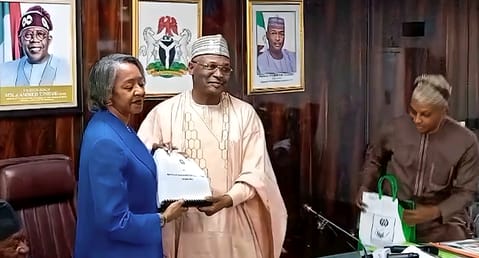
By George Mgbeleke
In a surprise leadership shake-up at Nigeria’s electoral umpire, Professor Mahmood Yakubu has handed over the reins of the Independent National Electoral Commission (INEC) to National Commissioner May Agbamuche-Mbu, who now serves as Acting National Chairman.
Yakubu made the announcement on Tuesday during a high-level meeting with Resident Electoral Commissioners (RECs) at the INEC headquarters in Abuja.
Agbamuche-Mbu, the oldest-serving National Commissioner by date of appointment, is stepping into the top role at a critical time for Nigeria’s electoral system, as the commission faces mounting pressure to implement deep reforms and restore public trust ahead of future elections.
The outgoing National Chairman of INEC made this disclosure at the third regular quarterly meeting with Resident Electoral Commissioners (RECs) for 2025, held at the Commission’s headquarters in Abuja.
Prof. Yakubu welcomed the commissioners to what would be his final quarterly engagement as chairman, expressing gratitude for their support and dedication over the years.
The meeting, he noted, coincided with the ongoing Continuous Voter Registration (CVR) exercise, which began seven weeks ago.
According to him,the latest figures released by the Commission, 6.8 million Nigerians have commenced their registration online, while 1.2 million have completed their registration in person.
The CVR exercise, he explained, will continue until August 2026, when it will be suspended not later than 90 days before the next general election in line with legal provisions.
Prof. Yakubu highlighted the Commission’s ongoing preparations for several major elections, including the Anambra State Governorship Election scheduled for next month, the Federal Capital Territory (FCT) Area Council elections in February 2026, the Ekiti State Governorship Election in June 2026, and the Osun State Governorship Election in August 2026.
He further disclosed that INEC has already commenced preliminary activities for the 2027 General Election, pending the passage of a new Electoral Act currently before the National Assembly.
The anticipated reforms, he noted, would necessitate revisions to the Commission’s regulations, guidelines, and election manuals.
Reflecting on his decade-long leadership, Prof. Yakubu detailed INEC’s extensive digital transformation, including the consolidation of the biometric register of voters and the replacement of several manual processes with technology-driven platforms.
Among these innovations are systems for candidate nomination, accreditation of observers and media, submission of polling and collation agents, voter accreditation, and result management. He also mentioned new technologies introduced with the support of development partners to enhance collation management, election monitoring, and training of electoral staff.
“The Commission has made tremendous progress,” he said, “but a lot more still needs to be done, especially in cleaning up the voters’ register, reviewing polling unit locations, and improving the management of internally displaced persons (IDPs) during elections.”
Prof. Yakubu announced that, in accordance with Section 306(1) and (2) of the 1999 Constitution (as amended), he had decided to step down. Following consultations with other national commissioners, Mrs. May Agbamuche-Mbu, the most senior National Commissioner by date of appointment, will assume office as Acting Chairman pending the appointment of a substantive head.
“This will allow the appointing authorities enough time to name a new chairman and enable smooth transition as the Commission prepares for major elections ahead,” he explained.
Prof. Yakubu expressed deep appreciation to the 24 National Commissioners and 67 Resident Electoral Commissioners he had worked with since 2015, as well as the staff of the Commission nationwide. He extended gratitude to the National Assembly, political parties, the National Peace Committee chaired by General Abdulsalami Abubakar (GCFR), civil society groups, the media, labour unions, security agencies, and development partners for their cooperation and support.
He reserved special praise for the National Youth Service Corps (NYSC), describing corps members as “the most patriotic, educated, and dedicated election officials,” and acknowledged his family for their patience throughout his tenure.
“Nigerians’ comments and criticisms encouraged rather than discouraged us to persevere,” he said. “Together, we built a foundation for credible elections in Africa’s most populous democracy.”
Prof. Yakubu unveiled two major publications chronicling his decade-long stewardship:
• “Election Management in Nigeria 2015–2025” — a comprehensive compendium of INEC’s activities over the last ten years, and
• “Innovations in Electoral Technology 2015–2025” — a detailed account of the technological reforms introduced under his leadership.
Both publications, he announced, are available on the Commission’s website for public access.
The outgoing chairman offered prayers for Nigeria’s continued democratic growth and officially handed over his notes to Mrs. Agbamuche-Mbu.
“With your indulgence,” he said with a smile, “I would like to invite you all to join me for a farewell photograph. From this point onward, this meeting will be chaired by the Acting Chairman of the Commission.”
Prof. Yakubu’s departure marks the end of a defining era in Nigeria’s electoral history — one characterized by innovation, transparency, and an unwavering commitment to deepening democracy.
Politics
2026 Budget :INEC Seeks N873bn for 2027 Polls, …..Proposes N171bn allocation for this fiscal year
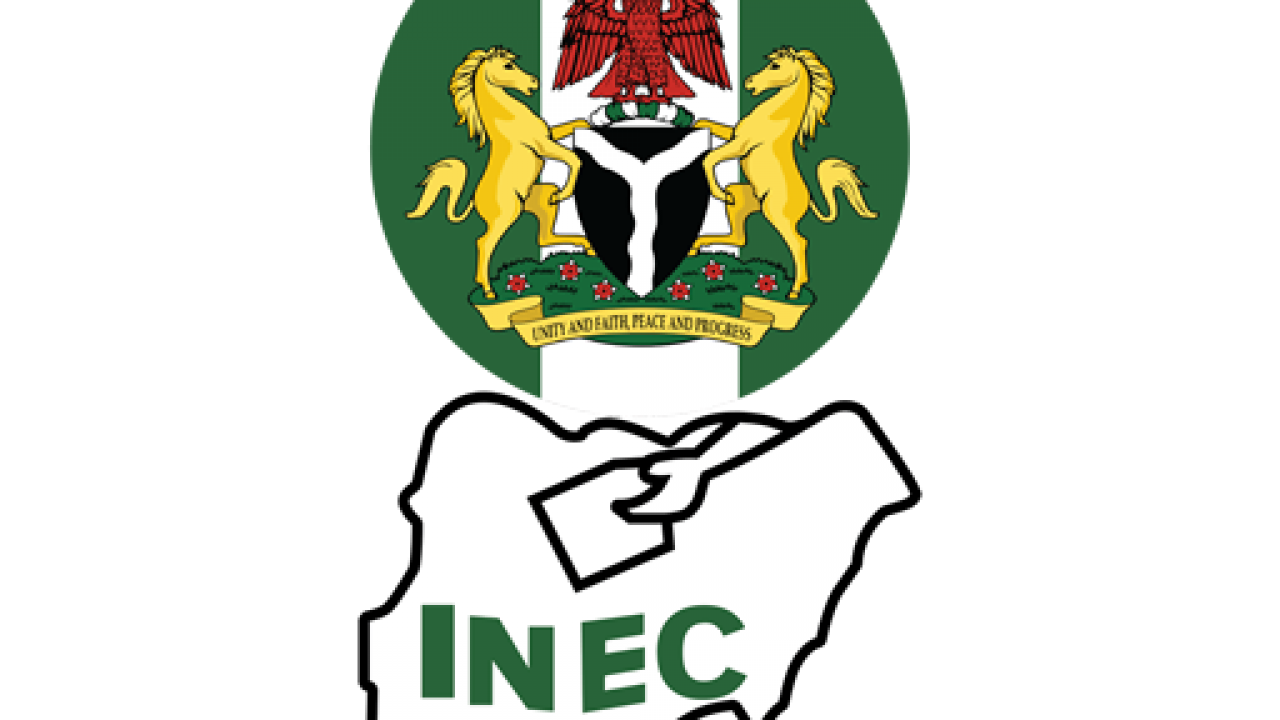
By George Mgbeleke
Ahead of 2027 election the Independent National Electoral Commission (INEC) has proposed N873.778 billion for the conduct of the 2027 general elections.
Chairman INEC, Prof. Joash Amupitan, declared this during the presentation of the Commission’s 2026 budget proposal and projected cost for the 2027 polls before the National Assembly Joint Committee on Electoral Matters in Abuja Thursday
Amupitan clarified that the proposed N873.778 billion election budget is separate from INEC’s 2026 appropriation proposal, which puts the Commission’s operational expenditure at N171 billion.
The 2026 allocation is expected to cover routine activities, including the conduct of by-elections and off-cycle governorship elections.
He noted that the projected election cost excludes a fresh request by the National Youth Service Corps (NYSC) seeking an upward review of allowances for corps members deployed as ad-hoc election staff.
Providing a breakdown of the projected election budget, the INEC chairman said the estimate is structured across five major components, including N379.748 billion for operational expenses, N92.317 billion for administrative costs, N209.206 billion for technological requirements, N154.905 billion for election capital projects and N42.608 billion for miscellaneous expenses.
Amupitan explained that the budget proposal was prepared in compliance with Section 3(3) of the Electoral Act 2022, which mandates the Commission to prepare its election budget at least one year before the general election.
On the 2026 fiscal projections, he revealed that the Ministry of Finance had issued the Commission a budget envelope of N140 billion, while INEC proposed a total expenditure of N171 billion, comprising N109 billion for personnel costs, N18.7 billion for overheads, N42.63 billion for election-related activities, and N1.4 billion for capital expenditure.
The INEC chairman expressed concerns over the envelope budgeting system, describing it as unsuitable for the Commission’s operations due to the urgent and unpredictable nature of electoral activities.
He also identified the absence of a dedicated communications network as a major operational challenge.
Speaking during the session, Senator Adams Oshiomhole (Edo North) argued that external agencies should not impose budgeting frameworks on INEC, considering the sensitive nature of its mandate and urged Parliament to align funding with the Commission’s actual requirements.
Similarly, a member of the House of Representatives, Billy Osawaru, called for INEC’s budget to be placed on first line charge as stipulated in the Constitution, while the Joint Committee approved a motion recommending a one time release of the Commission’s annual budget and said it would consider NYSC’s request for about N32 billion to increase allowances for corps members to N125,000 during election duties.
Chairman of the Senate Committee on INEC, Senator Simon Lalong assured legislative support for the Commission, while Chairman of the House Committee on Electoral Matters, Rep. Bayo Balogun, cautioned INEC against making promises it may not fulfil, recalling the controversy surrounding assurances on real fime result uploads to the INEC Result Viewing (IREV) portal during the last general election.
Politics
ADC Flags Off Membership Revalidation, Mobilisation and Registration; …… Inaugurates State MRMR Committees in Abuja

By Our Correspondent
The African Democratic Congress (ADC) has successfully flagged off its nationwide Membership Revalidation, Mobilisation and Registration (MRMR) exercise and inaugurated the State MRMR Committees.
The landmark event took place on Thursday at Barcelona Hotel, Wuse II, Abuja. It was attended by NEC Members, party leaders, key stakeholders, and dedicated party faithful from across the country.
In his inaugural address,National Chairman of the party and former senate President, Senator David Mark the party described the MRMR exercise as a strategic and transformative step toward strengthening the internal structures of the ADC, deepening grassroots engagement, and repositioning the party for greater national impact.
Members were urged to actively participate in the process to ensure the development of a credible, updated, and inclusive membership database.
Mark further announced that the newly issued membership card under the MRMR exercise officially supersedes and renders all previously issued ADC membership cards invalid.
Consequently, all members are required to complete the revalidation and registration process in order to retain their active membership status and full privileges within the party.
The inauguration of the State MRMR Committees underscores the party’s commitment to transparency, accountability, and effective coordination at the state level. The committees have been mandated to ensure a smooth, transparent, and successful implementation of the exercise nationwide.
According to him,ADC remains resolute in its mission to deepen democratic values, expand its membership base, and build a stronger, people-centered political movement across Nigeria.
Politics
NEDC Strengthens Ties with Journalists to Boost Public Awareness
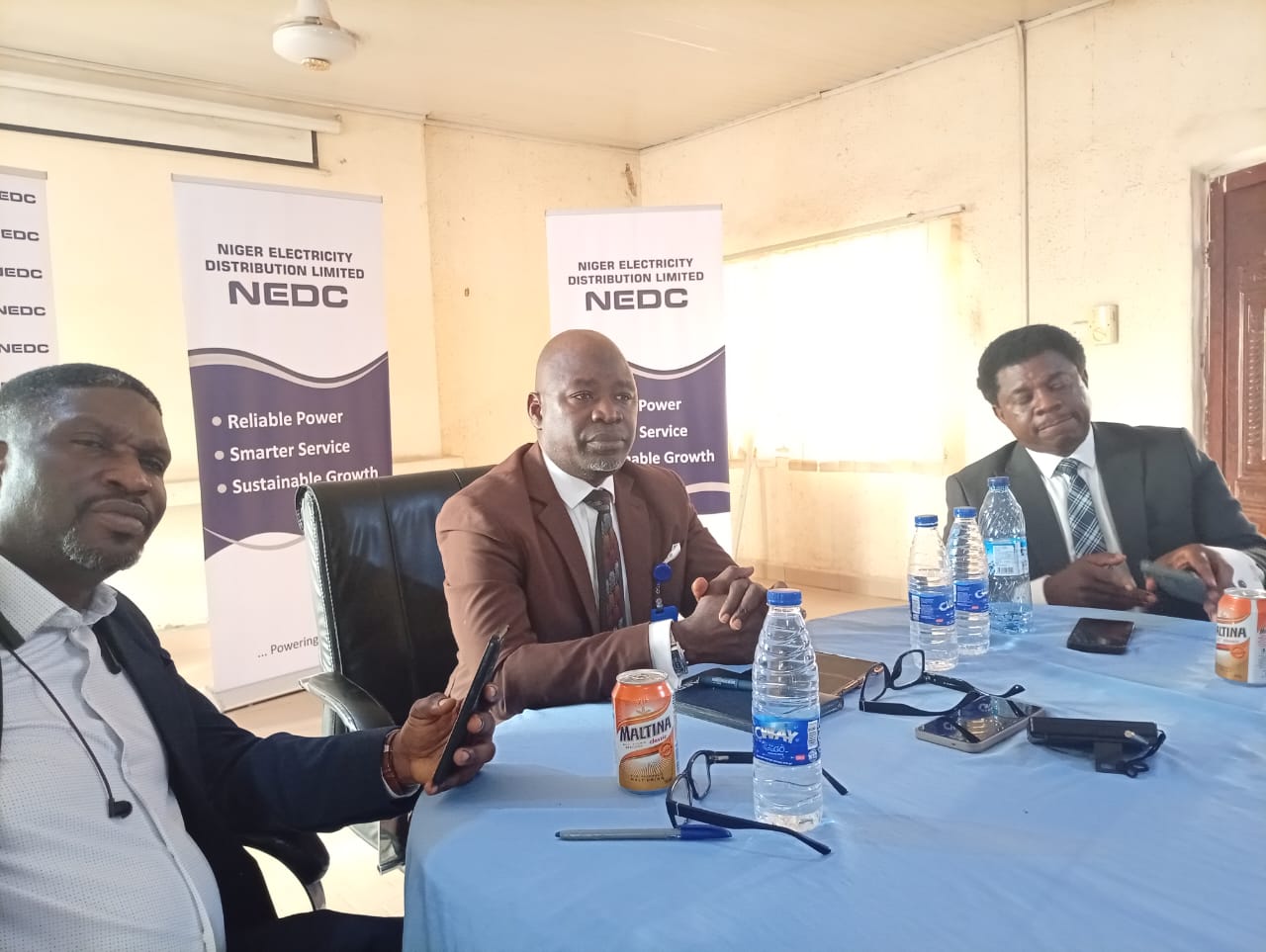
BY UTHMAN BABA-NASEER,MINNA
The Niger Electric Distribution Company Limited (NEDC) has announced plans to partner with journalists to improve development communication and increase public awareness of its activities and services.
The Managing Director of the company, Engineer Sam Odekina, made this known during a two-hour interactive session with journalists at his office.
He described the media as a key partner in progress, saying the company decided to work closely with journalists to better inform and educate the public about its operations, policies, and ongoing projects.
According to him, many electricity consumers want more information about the company’s activities. He explained that the media can serve as a reliable bridge between NEDC and its customers by providing accurate and timely information.
Engineer Odekina also described the media as the “fourth estate of the realm,” stressing its vital role in promoting transparency, accountability, and public understanding. He expressed confidence that the partnership would strengthen communication and build trust between the company and its customers.
In his remarks, the Head of Consumer Experience, Mr. Kene Ofili, appreciated the media for its contributions, noting that journalists have helped the company to properly inform and guide the public on important issues.
He appealed to journalists to always verify information with the company before broadcasting or publishing reports, to ensure accuracy and fairness.
Also speaking, the Head of Brand Marketing and Corporate Communication Mr. Omede Odekina assured journalists that the company would continue to share information about its challenges and activities so that the public can have a clearer understanding of its operations.
The interactive session highlighted the long-standing relationship between NEDC and the media and reaffirmed their commitment to working together in the interest of the public.
-

 Politics6 months ago
Politics6 months agoASUU-NDU protest against FG loans, unpaid salaries,Non-Implementation of agreements …..says loans is generational slavery
-
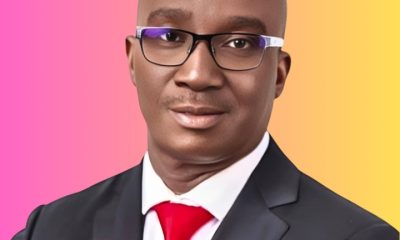
 Politics9 months ago
Politics9 months agoGov Okpebholo moves to end Cultism *Threatens action against leading cult groups *Vows to demolish more cult houses in Edo State
-

 Business & Economy6 months ago
Business & Economy6 months agoPC-NCG Issues Disclaimer on Purported Nigerian Coast Guard National Orientation Exercise In Anambra State
-

 Entertainment2 years ago
Entertainment2 years agoJubilation galore as Parishioners of CKC Kurudu celebrate their cultural heritage ….FG should exploit our Cultural heritage to unite Nigerians-Rev Fr Dim
-

 General News2 years ago
General News2 years agoReps hold public hearing on FMC Ugwuaji Awkunanaw
-

 General News2 years ago
General News2 years agoCelebration galore as UDA Successfully Elected New Exco ……I will digitalize processes that will raise UDA to greater height -Comr. Okejiri
-

 Law & Crime8 months ago
Law & Crime8 months agoICPC pledges to collaborate with FIDA to end Sex for Marks in tertiary institutions
-

 Law & Crime7 months ago
Law & Crime7 months agoLegal practitioner raises alarm over threat to his life by CSP Muhammed Abdulkareem

